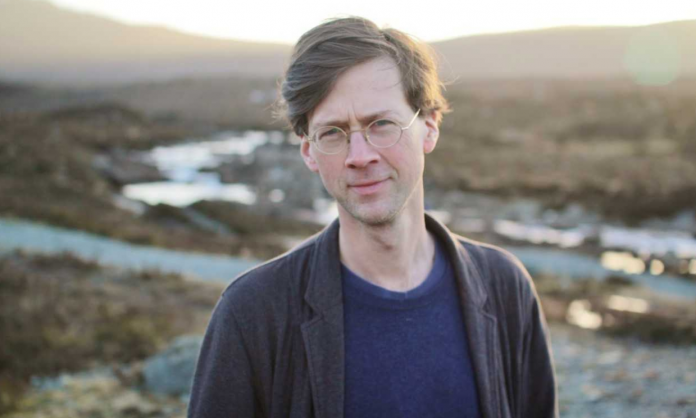by John Fitzgerald
Fennelly’s of Callan was the venue for a presentation of Arán & Im, in October, a performance by travel writer/broadcaster Manchán Mangan in which he enthralled the audience for 70 minutes with his own peculiar take on the history and mythology of Ireland, and his passion for the Irish language.
This was a demanding enough theatrical venture, but Manchán managed to go through all the stages of baking a loaf of traditional Irish sourdough bread, in between offering his pearls of wisdom, and insight into our misty Celtic past. He paid homage via quirky anecdotes and recitations to more than 4000 years of milling and baking on this island.
Darkness had fallen over Fennelly’s courtyard as the performance opened, and then the rain started to fall, first as a light drizzle but quickly turning to heavy showers that continued right up to the end of the show.
Though the audience was sheltered by canopies, these were buffeted by squally winds and the rain drenched a few patrons. But while most of us sat protected in our winter gear, Manchán was undaunted by the elements. If anything, he seemed to revel in the punishing downpour.
But nobody cared too much about getting wet, so engrossed were they in the story of how the Irish arrived here all those thousands of years ago, of the ancient Fianna and the pre-Christian race of deities called the Tuatha Dé Danann and the abiding power and beauty of our native tongue.
Manchán cited many of the magical Gaelic words and phrases that add different shades of meaning to our lives, the landscape, and the vast universe. It was a bit disorientating at times, as he switched abruptly from expounding on the origins of belief in fairies and other mythical creatures to throw another handful of flour into the bowl and add some water.
Not that the dough needed any more water because the rain was pelting down, making little rivulets in the courtyard and rustling the carpets of withered autumn leaves that glistened in the spotlight. Manchán frequently stepped out from under his canopy, heedless of the torrent, the rain dripping from his face and clothes as he exulted in the richness of Gaelic or the appeal of naturally fermented hand-made bread.
He recalled how in ancient times the divide between this world and other dimensions was thinner than it is now, with alleged visitations from the “other world” deemed an everyday occurrence. Interestingly, he explored how the supernatural supposed fables of the past are to some extent being validated by the latest scientific discoveries. He hinted at there being more to the age-old beliefs in the supernatural than mere superstition.
Advances in Quantum Physics may be taking us away from 19th century materialism and back again to an acceptance that the universe may be a magical sort of place after all, something our ancestors of both Christian and pre-Christian eras took for granted. Electrons disappearing in one location and reappearing in another is not so far removed, he mused, from what passed for magic and otherworldly phenomena in our Celtic past.
At the end of the presentation, Manchán added the finishing touches to his baking. Making a cross on the top of the loaf he reminded us that this was done in the old days to ensure that any fairies inside it could escape before it was cooked to avoid being burned alive. Some patrons wondered if the fairies had been at work during his performance because the rain stopped and the wind fell silent at almost the exact moment that Manchán took his final bow.
Everyone got a slice of sourdough bread on their way out of Fennelly’s and some homemade creamery butter to spread on it. We also took away with us a deeper appreciation for our language, a priceless jewel that all too many people are prepared to cast off like an unwanted piece of clothing when we ought to be preserving what is the essence of our culture and national identity.








